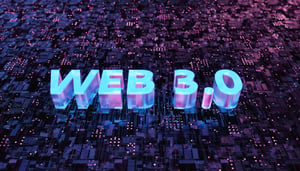There is much to learn about the world of web3. In this article, we’ll be looking at the various disadvantages of the newest iteration of the internet that you should be aware of. We’ll also take a look at the advantages so that you can weigh up the pros and cons of all things web3. Let’s dive right in.
Web3 relies on artificial intelligence, blockchain technology, and machine learning to create a decentralized internet. This online ecosystem presents a variety of challenges and limitations. Before we unpack those, let’s take a look at the benefits and opportunities of web3.

The Advantages of Web3
As web3 continues to develop, there are a number of existing and anticipated advantages, namely:
- Ownership: Having a decentralized web means that users will have control of their data and therefore ownership of their content and information. This concept is in direct opposition to the idea that users or consumers are the product, which is a highly criticized aspect of web2.
- Semantics: Semantic search delivers better results since the search engines are advanced enough to understand various contexts, instead of exact match keywords
- Personalization: One’s experiences online can be tailored to your personal preferences like never before, with more relevant content to meet each individual’s needs. It will also change the way people connect and collaborate online.
- Decentralized: We touched on this above, but it warrants its own point. This means organizations like Meta and Google will not be the data entities that we know them to be since data will not be controlled or centralized. This also leads to the concept of a more democratized version of the internet.
- Metaverse: Web3 opens up the world to the possibilities of the metaverse, where the online world becomes an actualized 3D space where people can immerse themselves.
- Transactions: With web3, transactions between parties are facilitated with ease, security, and speed. It is a space where smart contracts and NFTs face fewer barriers. There will be fewer intermediaries needed in the process of facilitating deals, which is a welcome change as trust in mega organizations and corporations continues to wane.
- Distribution: Data is distributed in nodes in web3, meaning users won’t have to face interruptions and downtime related to technical reasons.
- Transparency: With viewable source codes, users can track their data and find information about platforms first-hand, including information related to the value of assets.
The Disadvantages of Web3
Finally, let’s discuss the drawbacks of web3 that you need to be aware of:
- Still in its infancy, web3 is still being developed, which means that a lot of this is still in its conceptual phase. The technology and growth of web3 is expected to take a few years.
- While one of the goals of web3 is to present a more democratized version of the internet, users with outdated devices will face limitations in experiencing web3. Other forms of the web, like web2 which we currently use, will also become obsolete, potentially fueling disparity among first and third-world nations. It also means all websites and web applications will need to be upgraded to cater to the specifications of web3 (for example, the graphics).
- There are various expected changes in content models and spatial planning in the metaverse which will result in certain spaces facing access control and cost barriers put in place of traditionally free services.
- The issue of centralization becomes apparent as the internet providers of the decentralized web3 is still under the control of government entities, which means they are not truly free from control.
- While control of data is an advantage, blockchain technology records all transactions in a public transcript. This makes it easier to view personal and public data throughout the interconnectivity of web3 related to transactions that would otherwise be private. Likewise, avatars in the metaverse need to be linked to an actual person, as opposed to being populated with unverified characters that don’t exist in real life. This limits the ability to be anonymous.
- Decentralized apps that do not have adequate restrictions in place will be free from censorship, which can lead to illicit dealings happening online. Despite the tighter cyber security of web3, monitoring activity and putting regulations in place will be more challenging. Privacy policies will need to be put in place for users, and countries will need to decide on measures to implement regarding laws related to internet usage and transactions.
- At present, web3 activities take a heavy toll on the environment with a heavy carbon footprint. This has resulted in limitations being placed on mining in certain countries, so cleaner and more efficient methods will need to be developed in order for web3 to be sustainable and environmentally friendly.
- Web3 is a difficult space to navigate at present as it is not fully in fruition. This makes it complex to understand and use. It will take time before it becomes more user-friendly and widely adopted.
The wrap-up on the pros and cons of web3
That wraps up the various advantages and disadvantages of web3. We’d love to know your thoughts. Nexa is excited about the world of web3 and offers a range of web3 services to businesses. Reach out to us to find out more and begin your journey in the future of the web.
%20(1).png?width=2701&height=607&name=BRC_NEXA_LOGO_BLACK%20%26%20VIOLET%20(1)%20(1).png)
%20(1).png?width=2701&height=607&name=BRC_NEXA_LOGO_WHITE%20(2)%20(1).png)















Comments